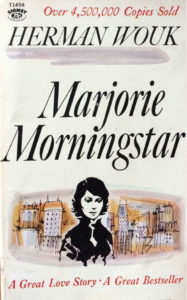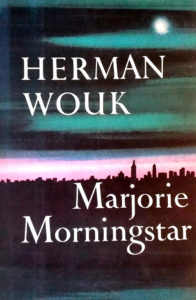It was only when Herman Wouk died this past May at the age of 103 that I learned how to pronounce the surname of a man who wrote one of my favorite books. It’s “woke” not “walk” and it is at once apt and completely wrong for the author of Marjorie Morningstar.
That 1955 novel, about a young Jewish girl who hopes to be an actress, was the second book mentioned in his New York Times obituary. The Caine Mutiny, which won the Pulitzer and was made into a memorable film with Humphrey Bogart, was the inevitable lede. Wouk also wrote War and Remembrance, Youngbloode Hawke and Don’t Stop the Carnival, adapted for the stage by Jimmy Buffett. It’s an incredibly varied body of work and maybe I would like it if I read it, but all I care about is Marjorie Morningstar, which I have re-read every year for almost 35 years.
I came to the book late, relatively; most of the women I know who fell in love with MM—and, boy, do I know a lot of women who love MM—discovered it in their teens. But I was in my 20s, staying with friends from college, possibly heartbroken, when I plucked it from a shelf in the guest room and found myself hooked.

To me, it’s a unicorn of a book—a so-called women’s novel, written by a man, that takes its heroine very seriously. (I’d compare it to Philip Roth’s When She Was Good, a comparison Roth would have found insulting. Roth was extremely critical of Wouk.) You, the modern reader, may not consider it important whether Marjorie succumbs to her first true love, Noel Airman, and has sex with him outside wedlock, but Wouk did. At the book’s end, when Marjorie confesses the affair to her true true love, Milton Schwartz, she considers her lack of virginity to be a “deformity,” akin to Noel’s damaged arm. It hangs crookedly because of a doctor’s mistake at his birth. Noel has learned how to hide that flaw and one has to study him closely to notice it.
Wouk commits hundreds and hundreds of pages to Marjorie’s dilemma. The reader is introduced to a very specific subculture, the first-generation offspring of Jewish strivers on New York’s Upper West Side in the 1930s. We see Marjorie with her starter boyfriend, George from the Bronx, who becomes less appealing to her after she begins to run with a faster, richer crowd of Columbia frat boys.
But the first person to seduce Marjorie, in a sense, is a glamorous-seeming female friend, Marsha, who encourages her dreams of a theatrical career. It is Marsha, a most unreliable friend in the end, who brings Marjorie to South Wind, the adult camp where she first catches a glimpse of Noel Airman. She develops a crush, the crush becomes a romance and the very long game of will-she or won’t-she is underway. And, in fact, it is Marsha who all but throws Marjorie into Noel’s arms and, by extension, his bed, several years later.
“Do you know what I’d have given for one hour of such a love affair? With such a man? My eyes,” she tells Marjorie right before she marries a much older man for his money and open adoration. “You’ll die screaming curses at yourself.”
Wouk was a popular writer whose work often was disparaged by serious literary critics. MM, in particularly, was vilified. But Paula Marantz Cohen, writing in the Wall Street Journal on the occasion of the novel’s 60th anniversary, argued that it can be compared favorably to The Portrait of a Lady.
“Wouk includes in the novel lengthy discussions between Marjorie and her friends about the meaning of life and the importance of art and money. Critics at the time found these passages silly and overlong; I found them fascinating. One of the shortcomings of The Portrait of a Lady, it seems to me, is that James never shows Isabel in sustained, substantive conversation; we have to take James’s word that she is exceptional. Wouk makes clear that Marjorie is not just beautiful; she is a thinking, articulate being.”
But I have to think that even those short-sighted readers who loathed MM realized how expertly Wouk wrote from Marjorie’s point of view. Which is why its epilogue, which indirectly inspired my latest novel, is such a disappointment.
After hundreds of pages of hewing to Marjorie’s POV, albeit with some of the most amazing monologues and set pieces you can imagine — the bar mitzvah! Noel’s theory of hits! Wally Wronken’s drunken diatribe! the theremin! Noel’s break-up letter! — Wouk abandons Marjorie for Wally, the boy who yearned for her. And once, just once, got a kiss from her. (He also stole a kiss from her as she slept, a moment that is, thankfully, depicted as rather creepy.)

By 1954, Wally is now a somewhat successful playwright. (I never bought this.) He has ended up at Marjorie’s suburban home through the machinations of the ever problematic Marsha. When he arrives, he sees a silver-haired lady on the porch and assumes she is a visiting grandmother.
“Despite the gray hair, (which is premature, she’s not quite forty),” Wally writes later in his diary, “she remains an attractive woman . . . I couldn’t help thinking how wise she had been to discourage me in the old days. A man of thirty-nine is not well-suited to a woman of [not quite] forty.”
In my 2017 re-read of the book, I stopped here and said to myself. SHE’S THIRTY FUCKING NINE.
Now I understand that 39 was kind of “over” in 1955, when MM was published. I don’t necessarily buy into today’s idea that 50 is the new 40, etc etc etc. But I couldn’t help wondering about the meeting from Marjorie’s point of view. What memories would Wally have stirred up in her? What regrets would she have? Not romantic ones, surely. Once she saw through Noel, she never regretted rejecting him.
But visitors from our pasts can remind us of who we once were—and who we planned to be. Throughout MM, Noel has predicted repeatedly, and often cruelly, that Marjorie will be just another “well-dressed mama from the suburbs.” And it would seem that is her fate, although there is one odd moment in the epilogue when she waltzes alone to a popular song, hinting at a secret love about which Wally knows nothing.
But visitors from our pasts can remind us of who we once were—and who we planned to be.So I wrote about a Mrs. Milton Schwartz, albeit a Madeline not a Marjorie, who has a surprise meeting with a man who once worshipped her. Within weeks, she has left her husband and her high school age son, determined to keep an old promise to herself. She’s going to matter. She’s going to make a difference. But how? To begin with, she finds a body, a murder victim. Then she becomes obsessed with another woman’s death and decides that writing about it will help her ascend to a reporting job on the newspaper where she has a clerical job. Here, of course, I part sharply with Wouk’s vision of his character — not in adding criminal elements, but in daring to believe that she is not the happily married woman Wally believes her to be, that she is not completely fulfilled by her life as a wife and mother.
Throughout the book, Noel dismisses Marjorie’s desire to be an actress as a tropism. I thought I knew what it meant, but I was wrong. It simply refers to all or part of an organism turning toward an external stimulant. For Wouk’s Marjorie, it’s the stage. For my Madeline, it’s the idea that she was destined to make a difference in the world.
Her journey is a meta one: Maddie decides to use the story of another woman’s death to make her reputation. In a sense, that is what I have done for much of my novel-writing career, which has now lasted longer than my newspaper career. Unlike Maddie, I worry about this and fear that my ambition may blind me to more important things. I worry, but I keep going.
Is MM a great book? I don’t know, I’m too close to it. But it is a serious book that finds a big, sprawling story in what seems like a small, narrow life. More novels, even crime novels, should dare to do the same.
***


















